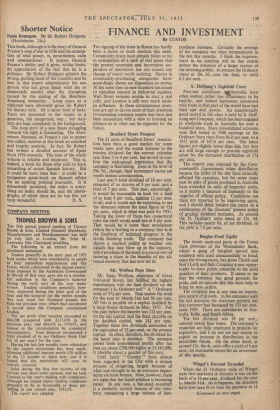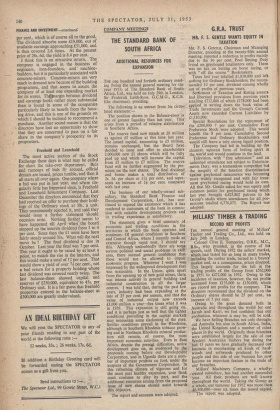FINANCE AND INVESTMENT
By CUSTOS THE signing of the truce in Korea has hardly been a factor in stock markets this week. Commodity prices have already fallen so far in anticipation of a spell of real peace that the present uncertain and incomplete sus- pension of operations has not caused any change of mood worth noticing. Shares in commodity-producing companies have accordingly shown no disposition to revive. At the same time no new incentive has arisen to stimulate interest in Industrial equities. Wall Street remains unable to start a real rally, and London is still very much under its influence. In these circumstances inves- tors are apt to devote most of their attention to examining company results that have just been announced with a view to forming an opinion as to what can be expected for the future, Bradford Dyers Prospect The El units of Bradford Dyers' Associa- tion have been a good market for some weeks now, and the recent increase in the interim dividend for the current calendar year from 3 to 4 per cent. has served to con- firm the widespread impression that the company is flourishing. Even at the level of 29s. 9d., though, their investment merits are worth serious consideration.
Last year's total dividend of 10 per cent. consisted of an interim of 3 per cent, and a final of 7 per cent. This year, accordingly, it would be reasonable to look for a final of at least 8 per cent., making 12 per cent. in ail, and it would not be surprising to see the directors restore the total figure to 121 per cent., which is what was paid for 1951. Taking the lower of these two conjectural rates the yield would work out at 8 per cent. That would be a more than satisfactory return for a holding in a company that is in the forefront of technical progress in the textile finishing trade. The company has shown a marked ability to weather any squalls that may blow up in the industry, and a'purchase of the stock is a sound way of securing a share in the benefits of the all- round recovery that has now set in.
Mr. Wolfson Pays More Mr. Isaac Wolfson, chairman of Great Universal Stores, has fulfilled the highest expectations with the final dividend on the company's 5s. Ordinary and " A "Ordinary units of 37i per cent. That makes the total for the year to March 31st last 50 per cent. All this is payable on a capital doubled by a scrip bonus declared in May, 1952. For the year before the interim was 121 per cent. on the old capital, and the final, payable on the doubled capital, was 181 per cent. Together these two dividends amounted to the equivalent of 25 per cent. on the present capital. In effect, therefore, the dividend for the latest year is doubled. The payment comes from consolidated profits after tax that are about £200,000 higher at £3,183,000. It absorbs about a quarter of this sum.
Until lately " Gussies " have always been regarded in the City with a certain amount of misgiving, largely because of what was thought to be an excessive depen- dence on bank finance. Now, however, there are signs that the liquid poition is becoming easier. In any case, a fair-sized overdraft is a perfectly normal feature of any com- pany transacting a large volume of hire- purchase business. Certainly the prestige of the company has risen tremendously in the last few months. I think the improve- ment in its standing will in due course attract the attention of a larger section of the investing public. At present the Ordinary stand at 30s. 3d., cum the final, to yield 8.5 per cent.
S. Hoffnung's Eightfold Cover Post-war conditions idAustralia have often looked rather too ifillationary to be healthy, and indeed businesses concerned with trade in that part of the world have had their ups and downs. An exceptionally good record in this class is held by S. Hoff- nung and Company, which has been engaged in wholesale trade in Australia for over a hundred years. Since consolidated accounts were first issued in 1948 earnings on the Ordinary have risen from 86.8 per cent, to a 1952 peak of 167.6 per cent. The latest figures are slightly lower than this, but they are still large enough to provide eightfold cover for the increased distribution of 171 per cent.
The import cuts imposed by the Com- monwealth Government when disinflation became the order of the day have naturally affected the company, but for some years past its sales of goods produced in Australia have exceeded its sales of imported items, so it enjoys a measure of immunity to the vagaries of official policy. Conditions out there are reported to be improving again, and I should think holders can count on a continuance of the directors' present policy of gradual dividend increases. At present the 5s. Ordinary units stand at 12s. 3d. This includes nearly 6d. of net dividend, so the yield is 7.4 per cent.
Burglar-Proof Equity The recent week-end party at the Forest Gate premises of the Westminster Bank, where a gang of burglars moved into residence and tried unsuccessfully to break open the strong-room, has given Chubb and Son's Lock and Safe Company a new oppor- tunity to draw public attention to the solid qualities of their products. It seems to me that the company has good grounds for pride, and an episode like this must help to bring in new orders.
The company has in any case an impres- sive record of growth. In his statement with the last accounts the chairman pointed out that turnover had increased by 123 per cent. since 1949. There are subsidiaries in Aus- tralia, India, and South Africa.
The last dividend was 18 per cent., covered nearly four times. The company's resources are fully employed in projects for expansion, and I do not see any reason to expect an increase in distribution in the immediate future. On the other hand, at around 12s. the 4s. units offer a yield of 6 per cent., an acceptable return for an investment of this quality.
Winget's Forecast Exceeded When the £1 Ordinary units of Winget were first marketed in January it was on the basis of a 10 per cent. dividend for the year to March 31st. As it happens, the directors have now seen fit to raise the payment to 12
(Continued on next page)
FINANCE AND INVESTMENT—continued.
per cent., which is of course all to the good. The dividend absorbs some £19,000, out of available earnings approaching 01,000, and is thus covered 2.6 times. At the present price of 28s. 6d. the yield is 8.4 per cent. I think this is an attractive return. The company is engaged in the business of engineers, iron-founders, and ' machine- builders, but it is particularly associated with concrete-mixers. Concrete-mixers are very much in demand now because of the building programme, and that seems to assure the company of at least one expanding market for its wares. Thtjnargin between dividend and earnings looks rather more substantial than is found in some of the companies particularly likely to benefit from the hous- ing drive, and this is one of the grounds on which I should be inclined to recommend a purchase. Another sound reason is that the directors have lost no opportunity to show that they are concerned to pass on a fair share in the company's prosperity to its proprietors.
Freehold and Leasehold The most active section of the Stock Exchange these days is what may be called for short the take-over department. Bids and rumours of bids fly around, official denials are issued, prices tumble, and then it all starts all over again. One company where a bid was put in last year, and where sin- gularly little has happened since, is Freehold and Leasehold Investment Company. Last December the directors announced that they had received an offer to purchase their hold- ings of the Ordinary stock at 30s. a unit. They unanimously rejected it, and said they would issue a further statement should occasion arise. Nothing further seems to have happened till April when the board stepped up the interim dividend from 3 to 4 per cent. Since then the El units have been fairly steady around 31s. What will the next move be ? The final dividend is due in October. Last year the final was 7 per cent. This year it ought to be raised by at least a point, to match the rise in the interim, and this would make a total of 12 per cent. That would show a yield of over 7i- per cent., not a bad return for a property holding whose last dividend was covered nearly twice. The last balance-sheet showed capital and reserves of E250,000, equivalent to 45s. per Ordinary unit. It is a fair guess that freehold properties entered in the balance-sheet at £300,000 are greatly undervalued.



































 Previous page
Previous page